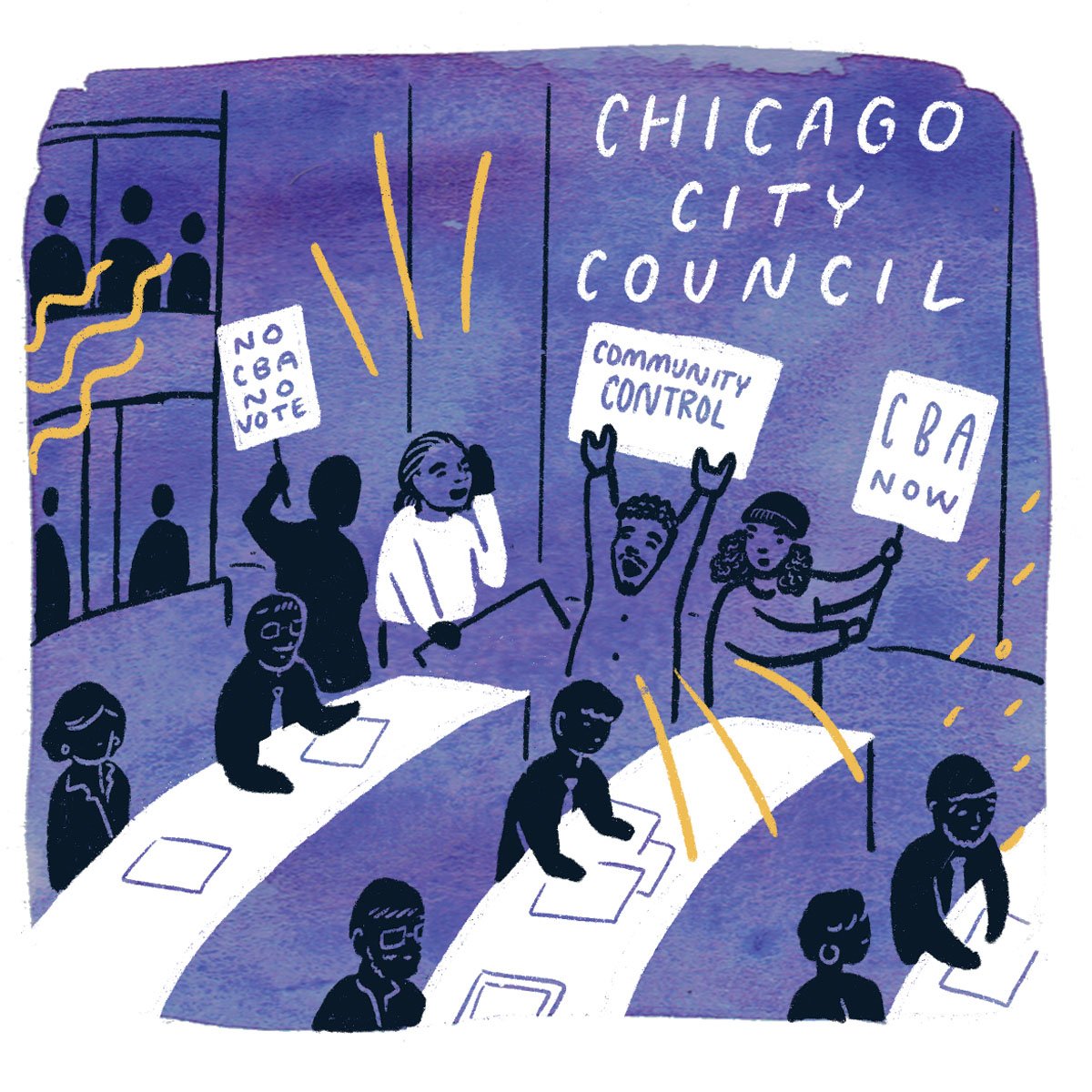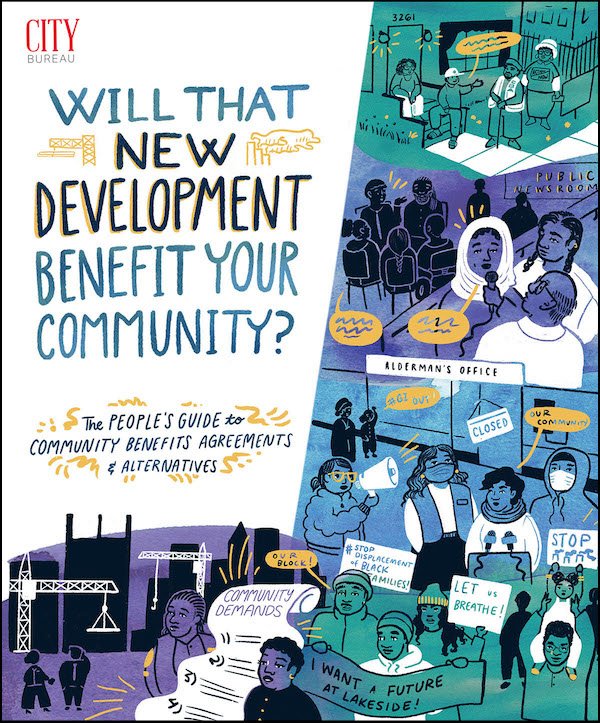Plus: Why you don’t hear about developments until after construction begins
By Alma Campos, Sarah Conway and Phoebe Mogharei, City Bureau
(Illustrations: Cori Lin/City Bureau)
This article is part of Will That New Development Benefit Your Community? The People’s Guide to Community Benefits Agreements and Alternatives.
Now that you know the basics of Community Benefits Agreements (CBAs), let’s take a step back and look at how real estate projects are developed and approved in the city of Chicago (see, What Is a Community Benefits Agreement?). The historical and political context around how things get built in this city can help you understand how to advocate for your own community when a new developer comes to the neighborhood.
What is the city government’s role in proposed developments, and how is that related to CBAs?
Depending on how large, complicated or expensive a project is, a developer may need approval from many different government entities (see, Here Are All the Players in the City of Chicago’s Development Process).
Many developers need or want government approval for their proposed projects, including for permits, zoning changes, regulatory approval and/or access to tax incentives or other government funding. This makes each step of the government approval process an opportunity: Community groups can pressure the city to deny permits, refuse tax incentives or delay/decline zoning changes unless the developer engages with their coalition.
The local alder is a key figure in this process, and a lot can depend on whether the alder feels the need to work with community members (if there’s an election coming up, for instance) and how friendly they are with developers. That’s because there is an informal practice in Chicago called aldermanic prerogative, which gives alders sole discretion over diverse government actions in their wards, including zoning and land use decisions. (In other words, City Council committees will vote whichever way the local alder wants them to.) Some City Council members use aldermanic prerogative to pressure developers to work with local residents—for example, not approving a zoning amendment unless the developer gets community support.
What are other ways that government can regulate developers and encourage them to provide community benefits?
A developer may include some measurable benefits for local residents in documents it submits to the city, such as a zoning amendment application or a redevelopment agreement.
A redevelopment agreement is a legally binding contract between a developer and the city of Chicago, ultimately approved by City Council. This agreement may include project plans and proposals for financing the project, including the use of city funds. Any benefits promised in this agreement become enforceable after City Council’s approval. The city can also add “clawback provisions,” to take back anything the city gave away as part of the agreement, such as land or money, if a developer fails to follow through on promises.
“[Developer-proposed] community benefits may go towards things that might be helpful in making a better development, but are almost always far short of what a community-driven CBA coalition would include,” says Clifford Helm of Chicago Lawyers’ Committee for Civil Rights.
Laws, policies and regulatory requirements are other powerful tools for government to guarantee accountability and oversight for development. For instance, Chicago’s Affordable Requirements Ordinance requires that residential developers provide a certain percentage of units at affordable rates, or they must pay an additional fee to the city. Additionally, policies can be important when communities don’t want a development in their backyard at all—either by discouraging developers or making it impossible for a project to move forward.
The same types of protections or requirements usually found in CBAs can and have been written into law. For instance, CBAs often require developers to pay a living wage or offer affordable housing units for that specific development. But some advocates say those policies should be the law of the land—as with Chicago’s Affordable Requirements Ordinance—rather than individually negotiated each time a developer comes to town.
When are developers required to notify nearby residents about their projects?
Alders are not required to inform community residents about most incoming developments, and those that do often engage residents in different ways. In some wards, there are zoning committees, for example. However, in other wards, those committees don’t exist.
Is this free resource useful to you? Consider making a donation to City Bureau to support future projects like this.
For some developments, residents in the immediate area must be notified by mail, but often only neighbors within 250 feet are notified—less than the length of a football field. If a development includes infrastructure improvements, such as a new sidewalk or a stormwater retention system, Department of Transportation street teams will notify residents through canvassing a neighborhood.
Ultimately, there is no set process in place for community engagement in the development process in Chicago. While Master Planned Developments (extremely large and complex projects) do require one community meeting prior to their Chicago Plan Commission hearing, most others do not, and the extent to which community members are informed of an incoming development is often at the discretion of an alder and the developers. Even when a developer is using public funds to build and operate, the information about funding is not easily accessible to the public.
Because of this, staying up to date about new developments requires active participation in your neighborhood, through your alder’s office, local community groups, local news or other sources. One handy tool is Chicago Cityscape (chicagocityscape.com), which tracks neighborhood, property and development data like demolitions and building permits. Anyone can create one free email notification for a specific neighborhood, ward or ZIP code via the website.
Will That New Development Benefit Your Community? The People’s Guide to Community Benefits Agreements and Alternatives informs, engages and equips Chicago residents to be active participants in the development process. Want to share this zine with your neighbors? You can order print copies in English and Spanish here.
Support City Bureau’s community-centered reporting by becoming a City Bureau sustaining donor today.
To get twice-monthly emails including Chicago news and events, sign up for City Bureau’s Chicago newsletter.


